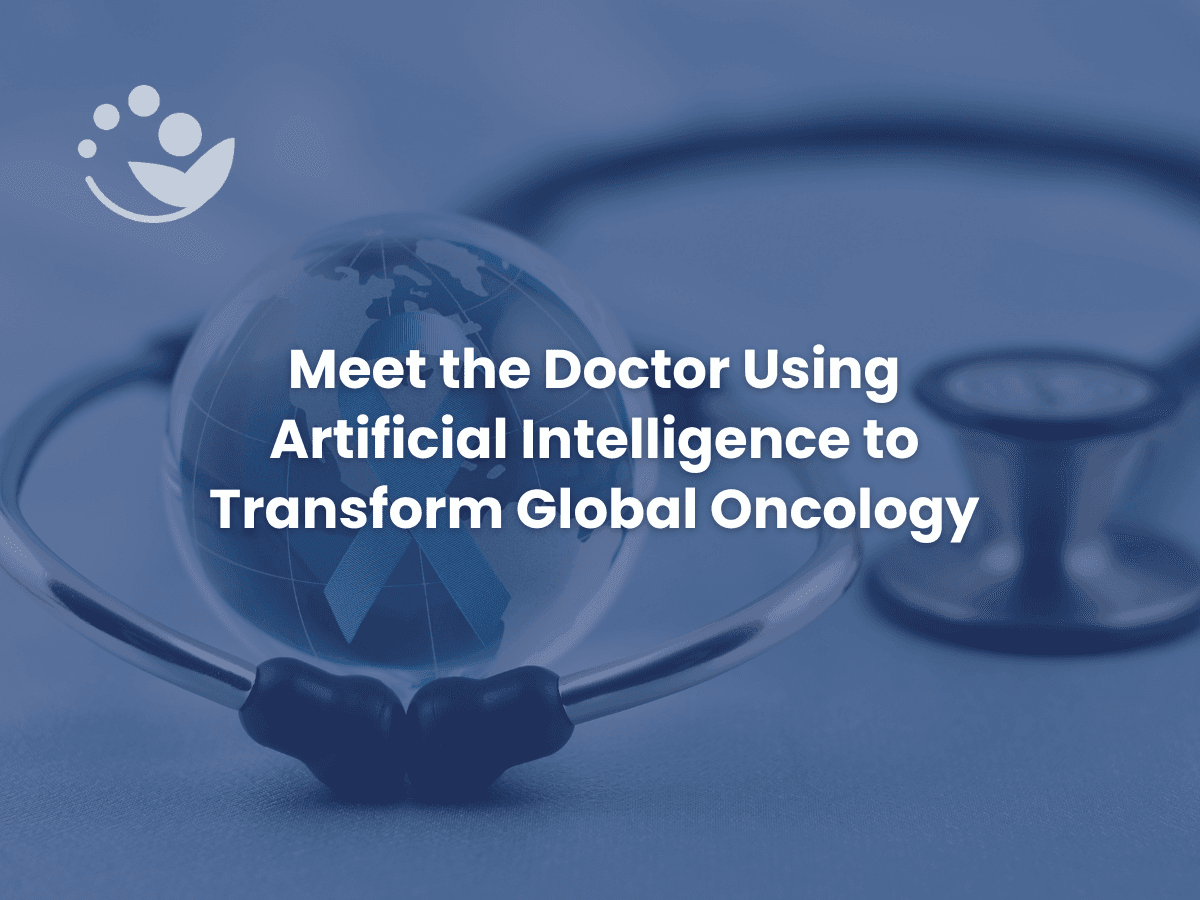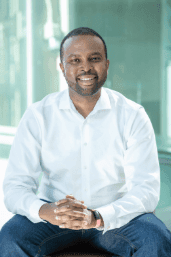Meet the Doctor Using Artificial Intelligence to Transform Global Oncology

Author
Binaytara Team
Dr. Kingsley Ndoh’s entrepreneurial journey from Nigeria to global oncology took root in both personal loss and professional curiosity. With a background in medicine and public health, he now leads Hurone AI, a venture-backed healthcare technology company transforming oncology through advanced AI. Hurone has developed and deployed oncology co-pilots for clinicians and patients: an AI-powered assistant designed to enable community cancer centers to deliver academic-level care and support patients navigate their cancer treatment journeys.
We spoke with Dr. Ndoh about his journey, the meaning behind his company’s name, and how he sees AI shaping the future of equitable cancer care.
Highlights of The Interview
Founding Hurone AI to address global oncology disparities through data diversity
Dr. Kingsley Ndoh’s journey from Nigeria to the U.S. and his death of his aunt from cancer inspired him to launch Hurone AI, a company focused on improving precision healthcare by integrating diverse data sources.
Using AI to support oncologists in under-resourced healthcare systems
Hurone AI has developed and deployed oncology co-pilots for clinicians and patients, with ongoing partnerships in UCSF, Mayo Clinic, and Johns Hopkins, including partnering in Aga Khan University Hospital in Kenya to address real-world patient navigation and enhance academic-level precision cancer treatments.
Advocating for global collaboration to drive equitable cancer care
Dr. Ndoh emphasizes the importance of working across borders to tackle both local and global health disparities and credits the collaborative spirit of the Binaytara conference for sparking meaningful connections and ideas.
The Interview
Binaytara| Question: Can you walk us through your journey into global oncology?
Dr. Kingsley Ndoh| Answer:
“I am originally from Nigeria, where I completed my medical training. Growing up, I saw the real-life impact of limited access to cancer care, both in my own family and in my community. My work to date has been largely motivated by the passing of my aunt, who succumbed to colorectal cancer after going undiagnosed for a year. That experience stayed with me. When I moved to the U.S. to pursue further training in public health, I began working with the Global Oncology Group and focusing more on ways to reduce disparities in cancer care.”
Q: What does the name “Hurone” mean, and how does it connect to your mission?
A:
"Hurone" is actually derived from the Spanish word for a ferret, an animal that is curious, persistent, and resourceful. That symbolizes our approach to data. We are focused on data diversity because precision healthcare cannot exist without representative data. If your AI model is trained only on one population group, it is not going to work optimally when applied to a broader population. So the name reflects our commitment to digging into diverse data sets to build solutions that work optimally in real-world and global contexts.”
Q: What sparked the idea behind Hurone AI?
A:
“In 2017, I read Humans Need Not Apply by Jerry Kaplan, a computer scientist at Stanford. The book explores how AI is transforming industries and points out that healthcare is one of the slowest to adopt it, even though it's the sector that could benefit the most. That insight stuck with me and really got me thinking.”
Q: How did that book influence your thinking about healthcare and technology?
A:
“It made me start to question how we could use AI to support the growing number of patients and the limited number of oncologists, especially in places like Africa, and even here in the U.S., I saw the potential for AI to act as a tool to augment the work of oncologists, not replace them, but help them do more with limited resources”.
Q: When did you actually start building Hurone AI?
A:
“In early 2020. By that point, I had already been thinking deeply about these issues. I spent time talking to patients, advocacy groups, and oncologists to better understand the real-world challenges. Hurone AI was born out of that process, an effort to dig into the problems I already knew existed and look for data-driven, AI-powered solutions.
While we started our work in Africa and continue to be active in Kenya, our current focus is on addressing a major issue here in the U.S.: around 80% of Americans receive cancer care at community cancer centers, which are non-academic. Yet patients treated at these centers face poorer outcomes compared to those at academic cancer centers.”
Q: Why is there such a large disparity in cancer care between academic and community cancer centers?
A:
“Cancer research is moving incredibly fast, with frequent updates to treatment guidelines based on high-impact studies and clinical trials. In academic cancer centers, where this research is often conducted, new findings are implemented in practice within about three months. But in community cancer centers, which serve about 80% of Americans, it can take three to six years for those same updates to reach the bedside. That lag can have a serious impact on patient outcomes.”
Q: What is Hurone AI doing to help bridge that gap in care?
A:
“At Hurone AI, we developed what we call an AI co-pilot called Hurona. It is a digital oncologist that works alongside clinicians. It helps ensure that patients receive the most accurate, up-to-date, and personalized treatment plans, no matter where they are being treated. Additionally, we have a humanoid patient-facing side that supports cancer patients in navigating their care and connecting them to resources. Our goal is to support oncologists with the best tools so they can deliver top-quality care, especially in under-resourced settings. We’ve validated this product at UCSF Brain Tumor Center, and are working with them, Johns Hopkins, and the Mayo Clinic in bringing this to market. Another key partnership we have is with Aga Khan University Hospital in Kenya, where we are working to implement this system in a clinical setting.
But implementation isn’t easy. One big challenge is that data, in many African hospitals, is still on paper. So, before you can even talk about machine learning, you have to address digitization and access to technology. It is a layered problem. But it is one we are addressing step by step, with local partners who understand the landscape.”
Q: What’s your perspective on how global health is typically framed?
A:
“The traditional global health narrative often divides the world into the global north, where things are assumed to be fine, and the global south, where problems exist and need fixing. There is some truth in that, but it is not the full picture. That framing can overlook the very real disparities we face here in the U.S.”
Q: What do you mean when you say, “Global health starts locally”?
A:
“There are huge health disparities right here at home. We can apply the same cutting-edge tools, like AI, that we use in global settings to solve problems in our own communities. Thinking globally doesn’t mean ignoring local challenges; in fact, the two are deeply connected.”
Q: How can global health work improve care in the U.S.?
A:
“There are diseases that are rare in the U.S. but common in other parts of the world, like Burkitt’s lymphoma, a childhood cancer that occurs mostly between 10 degrees north and 10 degrees south of the equator. If we want to understand and treat those conditions effectively, we need to collaborate globally and learn from where those diseases are most prevalent. That knowledge can then be brought back and applied here.”
Q: You recently connected with Binaytara and led sessions at our flagship conference, SCHD. What stood out to you about that experience?
A:
“I came across Binaytara on social media, then attended one of their conferences. What struck me was how approachable and collaborative the environment was; it felt more like a family than a formal meeting. That kind of setting makes it easier to build real relationships and think about long-term collaboration. I have already had follow-up conversations from that event, and I am thinking about how Hurone AI can contribute to Binaytara’s initiatives in places like Nepal.”
Q: What brings you the most fulfillment in your work?
A:
“What fulfills me most is bringing ideas to life, especially when I know they will have a meaningful impact on healthcare. Being part of building the future of healthcare is incredibly rewarding.”
Q: What do you see as the future of healthcare, particularly with AI?
A:
“I believe we are moving toward a future where big data, AI agents, and doctors work in perfect symbiosis. In the next five to ten years, I think it will become standard practice for AI to collaborate with clinicians to improve patient care. Once it’s clear that care quality improves when AI is part of the equation, it won’t just be a tool, it’ll be the norm.”
About Dr. Kingsley Ndoh

Dr. Ndoh is a global health leader and entrepreneur driving innovation at the intersection of oncology, technology, and research. He is the founder and CEO of Hurone AI, Inc., where he leads the development of scalable contextually tailored AI-driven technologies that transform the accessibility, efficiency, and delivery of precision cancer care, navigation, and research in the United States and around the world.